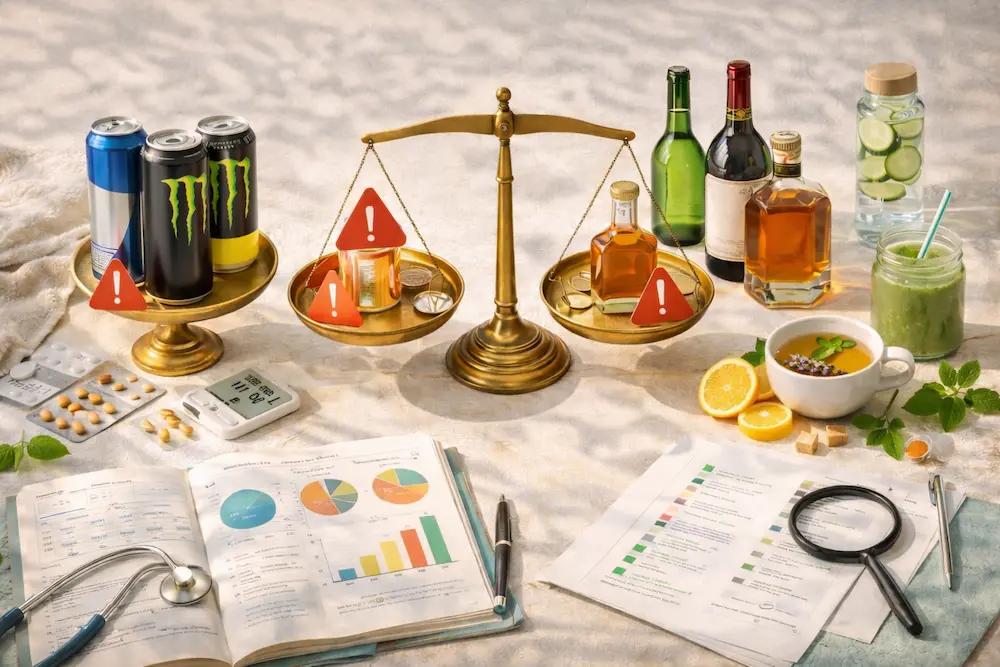Energy Drinks vs. Alcohol: Which One’s Really Worse?
Energy drinks and alcohol both come with risks-but which one poses a greater danger to your health, focus, and long-term well-being? We break down the science, myths, and real-world impact.

Energy Drink vs. Alcohol Comparison
Energy Drinks vs. Alcohol: Which One’s Really Worse?
We tend to treat energy drinks as harmless pick-me-ups and alcohol as the obvious villain. But is that really fair? When it comes to health risks, addictive potential, and long-term impact, the comparison isn’t as simple as “one’s legal at 18 and the other at 21.”
Let’s unpack it.
Short-Term Effects: Stimulation vs. Sedation
- Energy Drinks: Trigger your nervous system into overdrive. Expect jitters, elevated heart rate, anxiety, and insomnia - especially if consumed quickly or in large amounts.
- Alcohol: Slows everything down. Impaired coordination, mood swings, and poor decision-making are common within one drink.
Winner of More Immediate Harm? It depends. One numbs, the other overstimulates. But mix them (looking at you, vodka-Red Bull), and the risk multiplies.
Long-Term Health Impact
- Energy Drinks: Can contribute to high blood pressure, heart palpitations, metabolic syndrome, and chronic sleep issues. Frequent use builds dependence fast.
- Alcohol: Well-documented links to liver damage, cancer, memory problems, and long-term mental health challenges.
Verdict: Alcohol has the edge on chronic damage, but energy drinks may do more harm than expected - especially when consumed daily.
Addictiveness
Energy drinks might not cause traditional “addiction,” but they’re habit-forming and hit the same dopamine-reward systems - especially when tied to routines (e.g., “I need this to focus”).
Alcohol builds both psychological and physical dependency. Withdrawal can be severe, even life-threatening.
Who's More Addictive? Alcohol wins, but energy drinks are no joke - especially for teens and students using them to survive burnout.
The Hidden Risk: Mixing Them
Ever had a cocktail made with Monster or Red Bull? It’s not just a college party thing - it’s a dangerous stimulant-depressant combo. You feel “sober” longer than you actually are, masking alcohol's effects.
This increases the chance of:
- Drinking more than your limit
- Staying out longer
- Poor decision-making
- Cardiac stress and dehydration
Fun fact: One 2012 study found people who mix energy drinks with alcohol are twice as likely to report being hurt, injured, or taken advantage of while intoxicated.
Social Acceptance vs. Reality
- Alcohol is socially regulated (drink limits, ID checks), but culturally normalized - drinking is celebrated.
- Energy drinks are barely regulated and marketed like candy, even though they often contain twice the caffeine of coffee, plus taurine and sugar.
Kids buy them. Teens binge them. Adults down them at work. And there’s very little awareness of the risks.
So… Which Is Worse?
It’s not a race to the bottom - both can be risky, and both are overused.
But here’s the truth:
- Alcohol is more dangerous overall, due to long-term organ damage and addiction risk.
- Energy drinks are more deceptive, because people assume they’re safe - when they’re not.
What You Can Do Instead
If you're relying on either substance too often, it’s worth asking why.
For energy:
- Hydrate
- Prioritize sleep
- Eat complex carbs and healthy fats
- Use movement as a midday boost
For stress:
- Journal or vent
- Walk instead of drink
- Talk to someone
- Try breathwork or meditation
And if you're ready to quit energy drinks for good, Uncanly is your go-to tool.
We help you track cravings, understand withdrawals, and build back real energy - no sugar highs or shaky crashes.
Energy or escape? Choose better. Your body will thank you.
